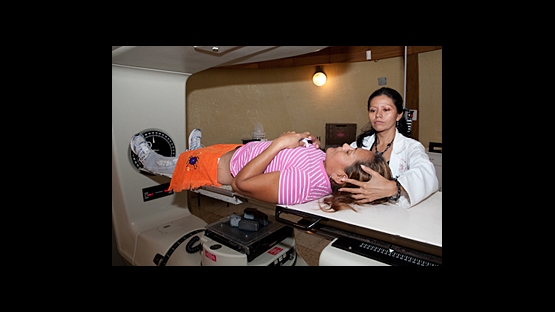Cancer, like any disease, can´t be fought piecemeal. One has to look at the big picture. Address the causes, early symptoms and effects; look at every area from prevention to palliative care.
That´s the reason behind the creation of model demonstration sites in eight developing countries, where cancer is a major concern and the government has displayed a deep commitment to fighting this disease.
The IAEA´s Programme of Action for Cancer Therapy (PACT) and the World Health Organisation (WHO) have come together, identifying countries in different regions to show how well different groups with varying interests can work together to broaden the cancer services being offered in a model clinic or hospital and then to extend those services throughout the entire country.
"The IAEA has been spending millions for more than 25 years on radiotherapy equipment and to train staff in developing countries. But the investment could not be maximized because the other areas necessary for the reduction of cancer mortality - such as prevention and proper cancer management strategies - were not in place," says Rolando Camacho, PACT Cancer Control Coordinator.
"With the creation of model demonstration sites we are promoting a more holistic approach to the fight against cancer; an approach that will garner the most positive results in the long run."
Latin America
Nicaragua, a country where the incidence of cancer has been steadily increasing for the past 20 years, was one of the first PACT/WHO Model Demonstration Sites (PMDS) created in 2006.
Cervical, prostate, breast and stomach cancer are the most common cancers that affect Nicaraguans. Access to diagnostic and treatment services is limited. And there is one radiotherapy centre to serve a population of almost six million, well below the best practice ratio of one machine per million people. In order to serve the needs of such a large population, the government and local and international non-governmental organisations (NGOs) need to work together, under a well-thought-out national cancer control plan. This is what the PMDS are all about and the foundation upon which an effective and efficient fight against cancer is built.
Since 2006, the IAEA has sent technical experts to help Nicaragua formulate its national cancer control plan, and has supported the government´s efforts to get funding for various cancer projects, with emphasis on improving cancer registration, educating and training personnel, introducing prevention and early detection programmes, expanding or improving treatment facilities and services, including radiotherapy, establishing palliative care and supporting cancer societies and NGOs.
Over the past five years, approximately 14 medical professionals have been trained in epidemiology, cancer control management, cancer registration, planning and fundraising.
"It might not look like much, but in the very specialised field of cancer control, to have 14 people who even qualify for this type of training in a developing country is phenomenal," says Camacho.
In 2009 PACT organised the donation of an Equinox Cobalt unit, used to administer radiation treatment to cancer patients, to the Centro Nacional de Radioterapia in Managua.
Cervical and breast cancer awareness campaigns are on-going and there has been increased use of Visual Inspection with Acetic Acid (VIA) testing for the early detection of cervical cancer in four regions. Equipment for cryotherapy, therapy using extremely cold temperatures, is available in regional hospitals, and work is being done in remote areas with indigenous populations. There are now 25 units across the country for the treatment of pre-cancerous lesions. And six gynecologists have been trained in colposcopy, a standard follow-up for abnormal PAP smears.
"Despite some successes, it will take at least another 10 years for all the efforts of the IAEA, the WHO, the Nicaraguan government and NGOs to bear the fruit that we want to see - which is a significant reduction in the number of people who die from cancer each year," says Camacho.
Background
There are PMDS in Albania, Ghana, Mongolia, Nicaragua, Sri Lanka, United Republic of Tanzania, Vietnam and Yemen.
The aim is to have at least 12 of these sites. The remaining four will be selected by 2012.


